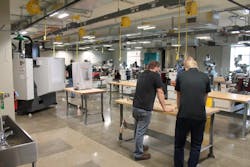The Advanced Manufacturing Partnership Laboratory located in downtown Grand Rapids on at Western University Michigan opened on Sept. 19. It occupies 15,000-square-feet but houses a lot of dreams.
A collaborative effort between the Grand Rapids Community College and West Michigan manufacturers, it aims to serve as a program to “cultivate the next generation of engineers, designers and other skilled individuals to serve the manufacturing industry.”
The building has its own history. Currently, it serves as WMU's downtown regional location, but it began as the Brown and Sehler Co., a wholesale manufacturer of horse harnesses and collars from 1925 to 1935. Various businesses moved in and out of the building for the next 40 years before H.H. Cutler Co., an infant and children's clothing manufacturer, occupied the space until 1995. The University moved into the building in May 2001.
The AMP Lab combines prototyping, training and small-scale manufacturing with the opportunity for individuals to earn college credits to be used toward a degree or certification. The facility includes 3D printers and scanners, a CAD/CAM lab, plasma cutter, laser cutter, welding station, metrology equipment and prototyping tools.
Early this month, GRCC began using the space three days a week for its AMP program cohorts. In January, WMU will offer courses for a certificate program in integrated design and manufacturing.
In addition, manufacturing engineering technology, engineering design technology and engineering management technology courses will be offered at the facility for students enrolled in WMU's ABET-accredited four-year engineering technology degree program.
"At full strength, the space will be used for six to eight WMU undergraduate courses a semester with class sizes of 16 to 24," says Dr. Steven Butt, WMU Department of Industrial and Entrepreneurial Engineering. "GRCC will also be offering associate degrees and manufacturing courses. In addition to college courses, workshops, specialized trainings, product design and manufacturing consulting will occur in the space."
The $2.7 million AMP Lab development and the equipment it houses were partially funded through private investment efforts and the Michigan Economic Development Corporation. Opportunities exist for the facility to be used as a makerspace for entrepreneurs needing manufacturing assistance.
"In addition to developing a skilled workforce, the AMP Lab has the potential to provide other important services to our region,” says John C. Kennedy, president of Autocam Medical, based in Grand Rapids Kennedy. "This facility and its students, led by engineering faculty and graduate students, can help local inventors prototype projects."
About the Author
IW Staff
Find contact information for the IndustryWeek staff: Contact IndustryWeek
